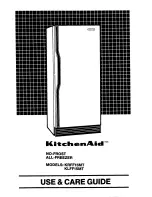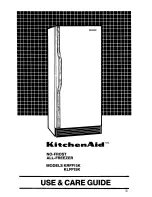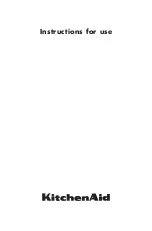
IMPORTANT SAFETY INFORMATION
ELECTRICAL
REQUIREMENTS
INSTALLATION
1
OPERATION
To avoid vibration, the cabinet must be set level.This is accomplished by adjusting
the (2) front leveling legs located under the freezer cabinet. To start the freezer, turn
the temperature control to the position corresponding to the desired cooling.
0 = No Cooling
1= Minimum Cooling
3, 4 = Medium Cooling
MAX= Maximum Cooling
The freezer temperature will vary depending on the quantity of the food stored and
on the frequency with which the door is opened.
This appliance must be grounded. In the event of an electrical short circuit, grounding
reduces the risk of electrical shock by providing an escape wire for the electrical current.
DEFROSTING
INSTRUCTIONS
This appliance is equipped with a cord having a
grounding wire with a grounding plug. The plug
must be plugged into an outlet that is properly
installed and grounded.
IMPORTANT WARNING
An empty refrigerator can pose a threat to children.
To render the unit harmless we strongly recommend
removing the door prior to disposal.
WARNING -
Improper use of the grounding plug can
result in a risk of electric shock. Consult a qualified
electrician or serviceman if the grounding instructions
are not completely understood, or if doubt exists as to
whether the appliance is properly grounded.
DO NOT USE AN EXTENSION CORD
Use an exclusive wall outlet. Do not connect your
refrigerator to extension cords or together with any
other appliance in the same wall outlet.
Remove exterior and interior packings, wipe the
outside thoroughly with a soft dry cloth and the inside
with a wet, lukewarm cloth. Avoid placing the cabinet
in a narrow recess or near any heat source, direct
sunlight, or moisture. Let air circulate freely around
the cabinet. Keep the rear of the freezer 5 inches
away from the wall.
Location:
1)
Select a place with a strong, level floor.
2)
Allow 5 inches of space between the back of the
freezer and any adjacent wall.
3)
Avoid direct sunlight and heat. Direct sunlight may
affect the acrylic coating. Heat sources nearby will
cause higher electricity consumption.
4)
Avoid very moist places. Too much moisture in the
air will cause frost to form very quickly on the
evaporator, and your freezer will have to be defrosted
more frequently.
1)
Turn temperature control to ‘0’(off) and unplug
power cord.
2)
Remove all frozen food.Wrap frozen food in
several layers of newspaper and cover with a blanket.
Food will say frozen for several hours
OR
store
frozen food in a cooler, additional refrigerator-freezer
or in a cool area.
3)
Place pans of hot water in freezer with door open
to speed melting. Directing air from an electric fan
into freezer will also help. Do not place fan in freezer.
4)
Remove frost.
5)
Wipe water from walls and bottom of freezer with
a towel or sponge.
6)
Wash inside walls.
7)
Rinse and dry thoroughly.
8)
Replace all frozen food.
9)
Plug in power cord and refer to “Operation.”
Defrost and clean your freezer when frost has built up to about 1 1/4”(6mm) thickness.
Complete defrosting and cleaning should be done at least once a year. In high humidity
areas, a freezer may need more frequent defrosting and cleaning.
IMPORTANT:
Do not use an ice pick, knife or other sharp-pointed tool to defrost freezer. Damage can occur.
Maximum cooling
































